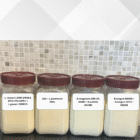Berberine and Its Health Benefits
Berberine is a natural compound found in several plants, including barberry, goldenseal, and Oregon grape. It has a long history of use in traditional medicine and has many health benefits. Some of the most well-known benefits of berberine include its ability to lower blood sugar, improve cholesterol levels, and reduce inflammation. In this blog, we will explore the various health benefits of berberine and how this can shift the balance from disease to health.

What is Berberine
Berberine is a compound that is found in various plants, including goldenseal, Oregon grape, and barberry. It has a long history of use in traditional medicine and is the centre of study and research for a variety of potential health benefits. Some research suggests that berberine has anti-inflammatory, antimicrobial, and immune-boosting effects, and it also has the potential as a treatment for certain health conditions, such as diabetes and high cholesterol. Berberine helps to improve metabolic dysfunction by modulating the microbiome (optimising SCFA balance) and anti-inflammatory balance by increasing T-regulatory cells.
Berberine and SIBO
Small intestinal bacterial overgrowth (SIBO) is a condition in which there is an abnormal amount of bacteria in the small intestine. This often leads to symptoms such as bloating, abdominal pain, diarrhoea, IBS, food intolerances, and many more. Berberine have applicability to SIBO because of their broad spectrum of action that discourages antibiotic and fungal resistance, their tolerability, relative affordability, and potential for long-term administration. It means that it kills or inhibits the growth of certain bacteria. This makes it useful in reducing the overgrowth of bacteria specially hydrogen producing bacteria in the small intestine in people with SIBO.
Berberine and Cancer
Some early research suggests that berberine has the potential as a treatment for cancer. One possible mechanism by which berberine kills cancer cells is through the activation of a family of enzymes called AMP-activated protein kinases (AMPK). AMPK regulates energy metabolism in cells. Activating AMPK inhibits the growth of cancer cells and promotes their death. Berberine activates AMPK in a variety of cancer cell lines, including breast, prostate, and colon cancer cells. In addition to its effects on AMPK, berberine also inhibits the growth of certain blood vessels. These blood vessels supply nutrients to tumours (angiogenesis), and to induce cell cycle arrest and apoptosis (programmed cell death) in cancer cells.
Berberine and Cholesterol
There are several ways in which berberine may be able to lower cholesterol levels. One mechanism is by reducing the synthesis of cholesterol in the liver. Berberine inhibits the activity of HMG-CoA reductase, an enzyme that plays a key role in the synthesis of cholesterol. By inhibiting this enzyme, berberine also reduces the production of cholesterol in the liver. Moreover berberine also reduces cholesterol levels by increasing the uptake and breakdown of cholesterol by the liver.
Berberine and Diabetes
Berberine may also improve blood sugar control by increasing the uptake and utilization of glucose by cells, and by decreasing the absorption of glucose from the diet. It increases the expression of glucose transporter proteins in cells, which in turn enhances the uptake of glucose, and to inhibit the activity of enzymes involved in carbohydrate digestion in the intestine, which reduces the absorption of glucose from the diet. Berberine as phytochemical also works as tissue specific kinase response modulators (SKRMs). Kinases are a group of enzymes with multiple functions that include facilitating insulin function.
Antimicrobial Benefits of Berberine
It has many antimicrobial properties. Moreover it has the ability to kill or inhibit the growth of a wide range of pathogenic bacteria, fungi, and parasites. One of the mechanisms by which berberine may exert its antimicrobial effects is through the inhibition of enzymes. These enzymes are essential for the survival and growth of microorganisms. Berberine inhibits the activity of enzymes such as DNA gyrase and topoisomerase, which are involved in DNA replication and transcription, and enzymes involved in the synthesis of proteins, nucleic acids, and cell walls. In addition to its direct antimicrobial effects, berberine may also have indirect antimicrobial effects through its ability to stimulate the immune system. It activates immune cells such as macrophages and neutrophils. These immune cells play a key role in the body’s defence against infection.
Anti-Inflammatory Benefits of Berberine
The anti-inflammatory effects of berberine take place due to many mechanisms. One mechanism is through the inhibition of enzymes involved in the synthesis of pro-inflammatory mediators, such as cyclooxygenase (COX) and lipoxygenase (LOX). Berberine shows to inhibit the activity of these enzymes, which may reduce the production of inflammation-promoting substances such as prostaglandins and leukotrienes.
Gastrointestinal Benefits of Berberine
One of many ways in which berberine improves gastrointestinal health is through its antimicrobial properties. Berberine shows activity against a wide range of pathogenic bacteria, fungi, and parasites, and it is useful to treat a variety of gastrointestinal infections. In addition to its antimicrobial effects, berberine has gastrointestinal benefits through its ability to reduce inflammation. It displays anti-inflammatory effects in many animals and in vitro studies, and is useful to treat inflammatory bowel diseases such as Crohn’s disease and ulcerative colitis. Berberine also offers many other gastrointestinal benefits, including the ability to improve bowel motility and reduce the secretion of stomach acid. It is useful to treat a variety of gastrointestinal disorders, including diarrhoea, constipation, and stomach ulcers.
Note: It is important to note that berberine should not be used as a substitute for standard therapies and that the decision to use berberine or any other supplement should be made in consultation with a healthcare professional.
Supplement Guidelines
Here are some general guidelines to consider if you are thinking about taking a berberine supplement:
- Talk to your healthcare provider: It is important to speak with your healthcare provider before starting any new supplement, including berberine. Your healthcare provider will help you understand the potential risks and benefits of taking berberine. The healthcare provide will also give you advice on whether it is appropriate for you.
- Be aware of potential side effects: Common side effects of berberine supplements may include gastrointestinal discomforts, such as abdominal pain, nausea, and diarrhoea. It is also possible for berberine to cause temporary yellowing of the skin and whites of the eyes. If you experience any side effects while taking berberine, stop use and speak with your healthcare provider.
- Store the supplement properly: Follow the storage instructions on the product label to ensure that the supplement stays fresh and effective.
- Follow dosing instructions: Be sure to follow the dosing instructions on the product label. Do not exceed the recommended dose. It is also a good idea to start with a lower dose and gradually increase it to the recommended level. This will help reduce the risk of side effects.
Dosage Recommendation: 500 mg to 4500 mg per day. High dose of 4000 to 4500 mg is used for SIBO treatment for short period.

Conclusion
In conclusion, berberine is a compound found in several plants and it has many medicinal properties. It is widely put to use to treat a variety of health conditions, and modern research supports its use for a range of conditions, including diabetes, high cholesterol, and gastrointestinal disorders. Berberine has many beneficial effects on health, including antimicrobial, anti-inflammatory, and antioxidant effects. It improves blood sugar control, lower cholesterol levels, and improve gastrointestinal health.









